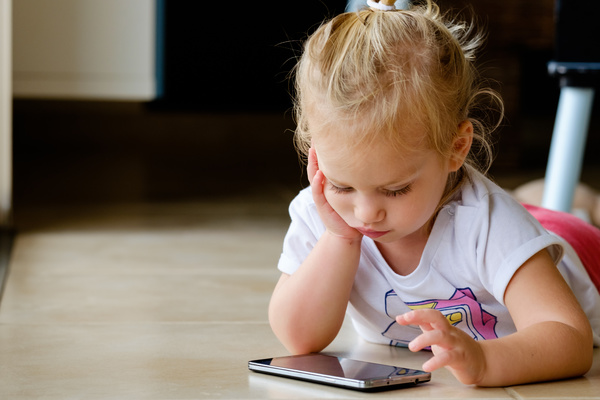Overview: Doctors are concerned about kids learning sedentary behavior at a young age due to excessive screen use. As a result, guidelines recommend low amounts of screen time at early ages, loosening limits slightly as kids get older. And there are some behaviors, such as limiting the use of screens as “babysitters” and using parental control software, that are recommended across the board.
Negative Impacts of Excessive Screen Time
Doctors and other experts have worried about children’s media use for decades, and that particular dispute may never be resolved. Social media challenges celebrating dangerous behavior and the difficulties we all have with digital wellness don’t help. Yet for doctors, the biggest concern is what kids are not doing when they use a screen — moving.
According to the WHO, the biggest problem is that screens encourage sedentary behavior. As a result, they recommend their usage be limited until kids develop healthy habits that don’t revolve around video time or when their favorite TV show airs.
Aside from safety and sedentary lifestyle, doctors also share concerns about:
- Trouble Falling Asleep or Staying Asleep: excessive screen time can be linked with insomnia due to the effects it has on brain activity. For example, blue light generated by screens can trick the body into staying alert and thinking it’s still daytime, minutes before your child is getting ready for bed. This late-night screen time can also delay the release of melatonin, a hormone that induces sleepiness, leading to more restless sleep.
- Impaired Vision: Looking at screens too long can create strain on the eyes, which may contribute to headaches, blurry vision, dry eyes, and more.
- Tendency for Immediate Gratification: Many mobile games, social media platforms, and other activities that make up your child’s screen time can create unhealthy dopamine patterns similar to those created by other, more serious addictions like substance abuse or gambling. Likes, leveling up, and other reward systems on these applications can create a dependency that should be replaced by more productive activities.
- Less Time Spent on Reading and Creative Tasks: Related to the point above, screen time can also inhibit your child’s creativity by making them too content with endless scrolling, mindless gaming, etc. Make sure your child has creative, “unplugged” activities to stimulate their mind in healthy ways, and look for ways to use screen time as a creative tool rather than a distraction.
- Disconnection / Less Sociability: Some studies have found that reliance on electronics can affect a child’s ability to read social cues and empathize with others. You may have noticed this in your day-to-day as well, where a child feels more comfortable texting or using social media than interacting with others face-to-face. It’s important to make sure your child has a healthy relationship with both types of socialization.
- Trouble Focusing: Studies have shown that excessive screen time can contribute to attention deficit disorder (ADHD), and cause children to have difficulty occupying their minds without a device to stimulate them.
Screen Time Recommendations by Age
The following screen time limits are the current guidelines, according to the American Academy of Child & Adolescent Psychiatry.
- 0-18 months: The only screen use recommended is video chatting with a close relative, such as a parent away on a trip. Otherwise, screens should be avoided as much as possible.
- 18-24 months: Educational programming is OK’d for a few hours a week, with a parent watching and playing along. The screen should be a supplement to an activity, not the focus of the activity.
- 2 years to 5 years: More educational screen time alone is fine, but anything non-educational should be kept to an hour per weekday and three or less on weekend days.
- 6 and up: At this age, recommendations are centered around encouraging habits and hobbies that don’t involve screens. Continue to limit non-educational screen use on weekdays while allowing a bit more on weekends. As kids make friends, and join more after-school and weekend activities, use their schedule and physical activity level to help determine what screen time is appropriate.

Additional Screen Time Tips for Parents
- Limit the use of screens as “pacifiers” or “babysitters.” While occasionally it will be necessary for parents to pop in a movie while they get something else done, consider other activities, especially as kids get older, such as crafts they can do themselves.
- Model positive screen usage and behavior. Kids learn best from observing their parents, and by keeping your phone in your pocket and limiting your TV usage, they’ll pick up the habit from you.
- Encourage physical activity. Build it into their screen time with dancing games and educational content that helps kids get up and move.
- Limit the screens in bedrooms. This is especially important for the hour before bedtime. Set up a charging station in a common area of the home where devices have to be parked for the night.
- Use parental controls. Consider the controls built into your kids’ devices and apps as well as third-party software like Screen Time.
How Screen Time Can Help
Busy parents of kids of all ages sometimes need help guiding their kids to healthier technology use. Screen Time can help by letting you set screen time limits and to know where your kids are spending their time online. See for yourself by trying Screen Time risk-free.



1 comment
Join the conversationKretaCX Dev - 28/01/2022
nice